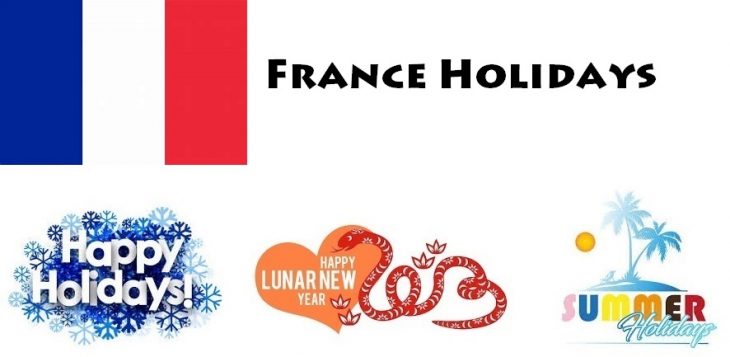France Holidays
France Public Holidays
Searching for the national holidays in France? All public holidays in France are treated like Sundays. This means that most of the France employees have a day off and all schools are closed on these office holidays. If you are planning a trip to France and want to know what the national and regional holidays are, check the details in the tables below.
List of Official Holidays in France for Year 2020
| # | Date | Holiday | Day |
| 1 | January 01, 2020 | New Year’s Day | Wednesday |
| 2 | April 10, 2020 | Good Friday | Friday |
| 3 | April 13, 2020 | Easter Monday | Monday |
| 4 | May 01, 2020 | Labour Day | Friday |
| 5 | May 08, 2020 | V-E Day | Friday |
| 6 | May 21, 2020 | Ascension Day | Thursday |
| 7 | June 01, 2020 | Whit Monday | Monday |
| 8 | June 07, 2020 | Mother’s Day | Sunday |
| 9 | June 21, 2020 | Father’s Day | Sunday |
| 10 | July 14, 2020 | Bastille Day | Tuesday |
| 11 | August 15, 2020 | Assumption Day | Saturday |
| 12 | November 01, 2020 | All Saints’ Day | Sunday |
| 13 | November 11, 2020 | Armistice Day | Wednesday |
| 14 | December 25, 2020 | Christmas Day | Friday |
| 15 | December 26, 2020 | St. Stephen’s Day | Saturday |
List of Official Holidays in France for Year 2021
| # | Date | Holiday | Day |
| 1 | January 01, 2021 | New Year’s Day | Friday |
| 2 | April 02, 2021 | Good Friday | Friday |
| 3 | April 05, 2021 | Easter Monday | Monday |
| 4 | May 01, 2021 | Labour Day | Saturday |
| 5 | May 08, 2021 | V-E Day | Saturday |
| 6 | May 13, 2021 | Ascension Day | Thursday |
| 7 | May 24, 2021 | Whit Monday | Monday |
| 8 | May 30, 2021 | Mother’s Day | Sunday |
| 9 | June 20, 2021 | Father’s Day | Sunday |
| 10 | July 14, 2021 | Bastille Day | Wednesday |
| 11 | August 15, 2021 | Assumption Day | Sunday |
| 12 | November 01, 2021 | All Saints’ Day | Monday |
| 13 | December 25, 2021 | Christmas Day | Saturday |
| 14 | December 26, 2021 | St. Stephen’s Day | Sunday |















































